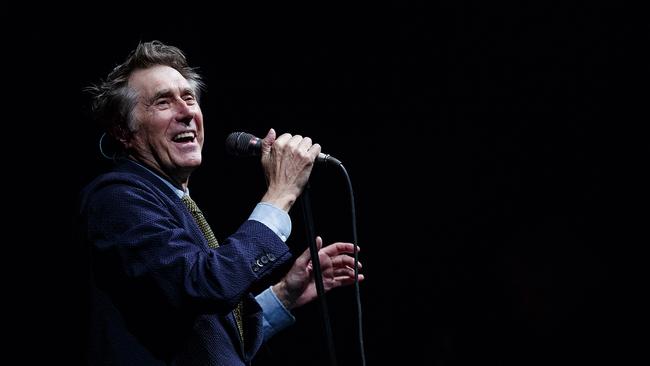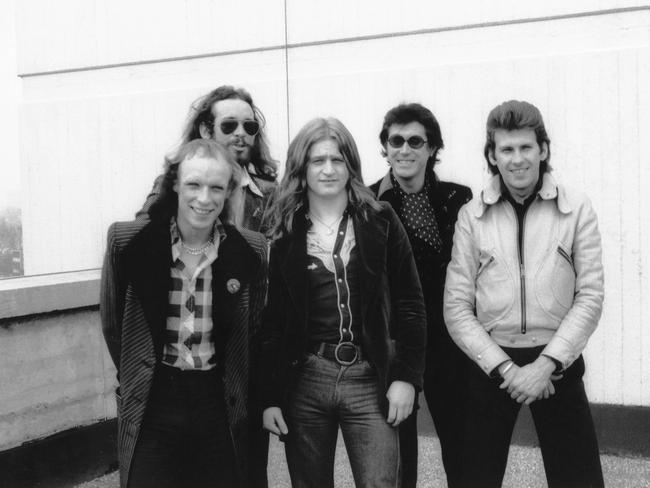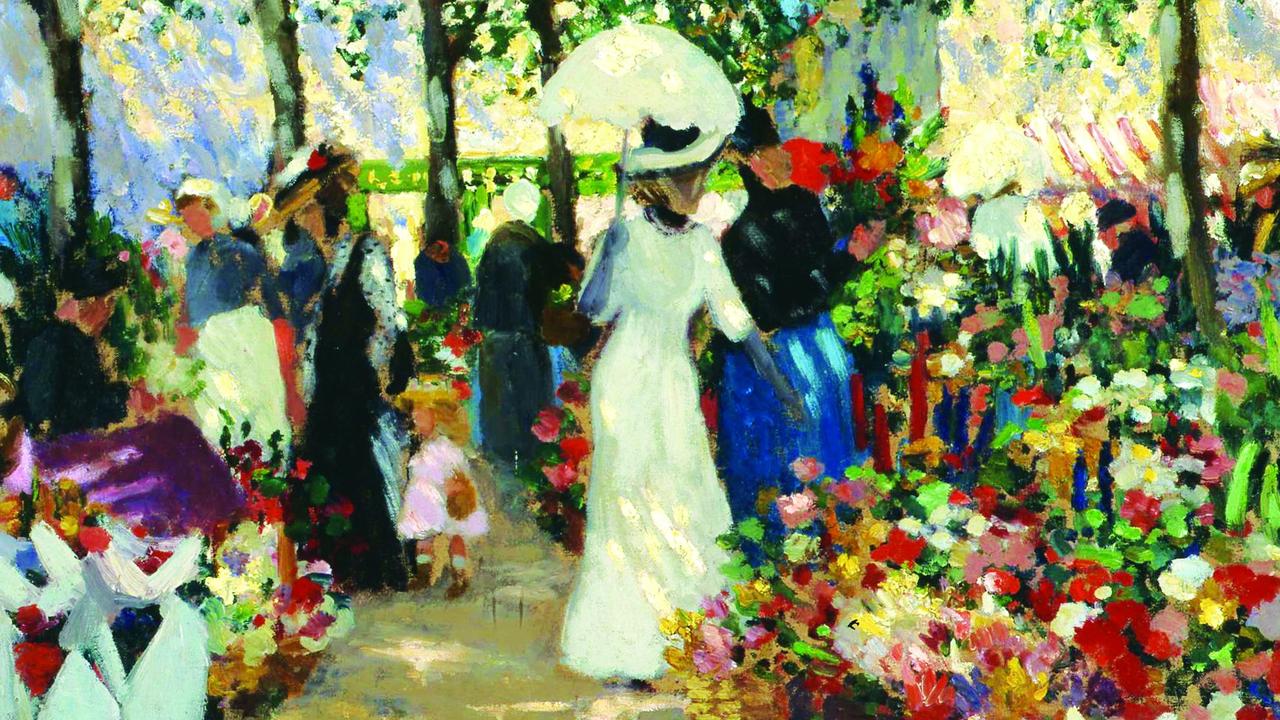At 74, Bryan Ferry is still music’s suavest frontman
By his own admission, work, rather than love, is Bryan Ferry’s drug of choice.

Unsurprisingly for a man who has built a career on stylish presentation, Bryan Ferry owns a studio in west London with proper wow factor. Millie, his chic young PA, leads me down a staircase lined with Marilyn Monroe prints by Andy Warhol, whom Ferry, once an aspiring painter and a lifelong art lover, met many times. Then through an office, where humming in pink on a wall is a neon sign reading “Roxy Music”. Everywhere there are references to the radical, romantic art-rock pioneers with whom he made his name, from a blown-up cover of their 1975 album Siren featuring a near-naked Jerry Hall, one of Ferry’s many glamorous exes, to a vintage analogue VCS3 synthesiser of the kind once used by former bandmate Brian Eno.
The gobsmacking lair, the female assistant and no sign of the man himself. Am I meeting a rock god or a Bond villain? All that’s missing is the glowering henchman and me being even remotely 007-like. Millie leads me, finally, into the studio control room, which feels more like a sauna. “You’re going to cook,” she says.
No, it’s not some kind of fiendish test, but preparation for a host who, at 74, is starting to feel the cold. And with that Ferry appears, shaking my hand and taking a seat next to the mixing desk. He’s about as casual as Ferry gets — dark-blue corduroy jacket and trousers, expensive jumper over shirt, whose top button is undone. No tie in the studio. The hair is still a decadent sweep, greying slightly at the temples. If it’s dyed it has been done subtly.
I’ve been nervous about this interview; some have found Ferry guarded and prickly. He turns out to be a bit of the first, but none of the second, courteous throughout. I suspect it’s nothing more complicated than shyness and an awareness of how fast his words can travel. He’s still wary of fame, he says, talking slowly and so softly I sometimes miss his words. “The great thing is there are so many different generations of people, so you can slip under the radar.”
Ferry’s worry about the cold suggests the first signs of frailty, but he seems in fine nick, which he puts down to pilates two or three times a week and “at least one martini a day”. While many of his peers have succumbed to substances, work — rather than love — is Ferry’s drug. “I’m sort of addicted to work,” he says. “I guess I just feel that I’ve got so much (material) that doesn’t get played unless I go out there and play it.”
His most recent album, Live at the Royal Albert Hall 1974, revisits a show from the start of his solo career as a subversive crooner, when he made two albums of cover versions. “I had so many albums by singers who had never written a song, like Frank Sinatra and Elvis Presley. They were interpretive artists, and I thought it would be good to make an album of songs that had influenced me.” That became These Foolish Things (1973), followed in 1974 by Another Time, Another Place.
Those records fed into his 1974 setlist, from show tunes such as Smoke Gets in Your Eyes to songs by Ferry’s peers. On Sympathy for the Devil, his Beelzebub is yet more decadent than Mick Jagger’s on the original. The box set of the live album includes a reproduced letter written to Ferry in 1973, turning down his request to play at the Albert Hall. His music, apparently, was “unsuitable”. He tried the Albert Hall again the next year and was successful. “I was coming in with an orchestra and wearing black tie, that helped.”
Ferry’s career has been defined by gaining admission to exclusive sets, from “Them”, the London clique immortalised by Peter York in his 1976 essay of the same name, to the rural aristocratic crowd that he joined in later life. A song in the Albert Hall show, a cover of Dobie Gray’s The In Crowd, seems to reference this. “I wasn’t really [in the fast set],” he says. “I was very much on the outside. That changed later, though. A little bit … a lot, really.”

Soon Ferry could be found escorting the model-singer Amanda Lear and going on the razz with Salvador Dali in Paris.
“He had this big Cadillac,” Ferry says. “He was a character, you know. I like characters. His art wasn’t really my bag, but … he had a salon in the Hotel Meurice, this huge suite with all sorts of people, like Andy Warhol’s Factory.”
London too was a whirl in the 70s. “It was a time for experiment,” Ferry says. “If you walked down the high street in Kensington or Chelsea there’d be real characters.” He lived in west London, and still does, in the townhouse he has had for 40 years; there’s also a country pile in Sussex.
Will London lose its cosmopolitan edge after Brexit? “I can’t see how that’s going to change,” he says. I segue into politics, which I know he hates talking about, having been branded a Tory-supporting nouveau toff.
Would he mind telling me how he voted in the EU referendum? “I do mind — ha ha ha.” How about Boris Johnson, what does he make of him? “I don’t really feel I want to talk about that.” I know he met David Cameron when he was prime minister — they talked about the Killers being influenced by Roxy Music. Ferry was impressed with Cameron then — are we in decent hands with Johnson?
“I said I didn’t want to talk about it!” he says amiably. “I hope so. He’s a bright guy.” Deciding to get the awkward stuff out of the way in one go, I ask about his love life. In 2013 Ferry split from his second wife, Amanda Sheppard, after less than two years of marriage. Sheppard, 37 years his junior, wanted children, but he didn’t. He divorced his first wife, Lucy Helmore, in 2003 after more than 20 years and four sons together.
Is he single now? “Ah, I don’t talk about that either,” he says, mock-mopping his brow. “You’ve got me sweating!”
We move on to the safer subject of clothes. “I always felt comfortable in suits. I always liked old movies: people always wore suits and hats and so on.”
A working-class boy from County Durham, he identified with Cary Grant, Fred Astaire and Noel Coward, men who sought debonair escape from humble beginnings. “In the early days of Roxy we had clothes as a kind of mask. We were testing out what we wanted to do and how theatrical we wanted to be.”
What does he make of the wave of dressed-down pop stars such as Ed Sheeran and Lewis Capaldi? Does he wince at their hoodies and baggy jeans? “Ah, it’s their thing. I don’t think about it. I would relate more to Prince, say.”
The Purple One recorded in this very studio, it turns out. “He wanted somewhere quiet and private to record,” Ferry says. In 2014 he saw Prince play the Hippodrome in London. “I saw him as he was coming through to go on stage and we exchanged pleasantries. I had dinner with him once, somewhere abroad, and he was great. I love his music. He was one of the best guitar players I’ve ever heard. And that night he was really on.”
Ferry himself has still got it live. His show last year at the Albert Hall was an epic, kicking off with a gorgeously hushed take on Roxy Music’s In Any Dream Home a Heartache. He said recently he feels more appreciated now, having been inducted into the Rock & Roll Hall of Fame with the rest of Roxy last year. That could be because he’s been playing live more, he thinks. Another tour starts next month. “My children grew up and I guess I had more time.”
In 2018, his sons, Otis, Isaac, Tara and Merlin, lost their mother to suicide. Have they all been pulling together? “Yes. They’re resilient,” he says. Merlin, his youngest, was also involved in a car crash that left him with a seriously damaged hand. “He wanted to be a guitar player and that’s not going to happen,” Ferry says.
Merlin is now moving towards publishing, while Isaac is a DJ in the US and Tara has worked as a model and musician. Otis became the best known of the Ferry boys when he was among pro-hunt campaigners who stormed the House of Commons during a debate on banning fox hunting.
“It’s not much fun being the son of someone who’s in the limelight, even though sometimes they’re reluctantly in the limelight,” Ferry says. “It puts a lot of pressure on you. I’m not sure I would cope.” His sons seemed to have turned out pretty well, by rock-star standards. That didn’t have too much to do with him, Ferry says. “Even when I wasn’t touring, I was in studios a lot.”
He gets his work ethic from his parents, he thinks. “My mum’s dad was killed in the First World War. She was the eldest of eight children and she had to look after her brothers and sisters.” His father, a ploughman, was “quite different to my mum; he was a country boy and she was very much a town girl”. Hence, perhaps, Ferry being part rural gent, part urbane urbanite. His father courted his mother for 10 years. “Yeah! On his plough horse.”
Did his parents understand his need to escape, first to study art at Newcastle University? “I guess so. I was always hungry to create a life which was interesting for me.” In the mid-1970s they moved south to look after his house in Sussex. “It had this amazing garden and my dad was a brilliant gardener. They were in paradise.”
Their son has also narrowed his world, with equally pleasurable results. “I have no social life! I’m travelling so much so when I get back to England I want to record.”
Eno is the same, he says. “Like me he’s still constantly at work.” They’ve trodden their own paths over the past 40 years, but Ferry speaks reverentially about him.
“Great artist. There’s never been anyone who’s come along since in electronic music, that I’ve noticed anyway, who’s as good as Brian.” Could they work together again? “Yeeeah, it would be nice to,” Ferry says.
THE TIMES


